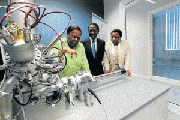
SCIENCE and Technology Minister Naledi Pandor yesterday praised South Africa for becoming a major world player in cutting edge nanotechnology despite only being involved for a short time.
Speaking at the launch of the new Rhodes University/ Department of Science and Technology (DST) Centre for Nanotechnology Innovation, Pandor said huge strides had been made since 2005 when South Africa took its first step entrenching this science by formulating a national strategy.
“Our strategy has been hailed by the science community as one of the best in the world.”
She said South Africa had been internationally praised for using this science to help socioeconomic development in the country.
During her visit, Pandor admired the latest time-of-flight-secondary-ion-mass-spectrometer (TOF-SIMS) which cost a staggering R17-million and will help the university focus on specialised cancer and micro-fibre research.
The equipment was bought and upgrades done thanks to a partnership between the DST/National Research Foundation (NRF) and Rhodes that has put the university at the forefront of nanotechnology research in recent years.
“I am on a mission to make South Africans proud of themselves. We are very important actors in the science community and we shouldn’t neglect that fact.”
The centre will be run by internationally acclaimed DST/NRF South African Research Chairs Initiative medicinal chemistry and nanotechnology Professor Tebello Nyokong.
Pandor praised Nyokong’s scientific publishing record, as well as her massive contribution to human capital development.
“Having a record of training more than 70 postgraduate students is a fabulous achievement.”
Besides inspiring dozens of students to new heights in science over the years, she said Nyokong had also published close to 500 papers in international journals – at an impressive 50 papers a year – thanks to the DST investment in nanotechnology.
Pandor said she believed the new technology investment would provide the necessary environment to advance research and called for better co-operation between universities involved in the science and industry.
Rhodes vice-chancellor Dr Sizwe Mbizela said the university was grateful that Pandor had invested so much money in new equipment that would be used to advance science on the campus, in the Eastern Cape and the rest of the world.
Deputy vice-chancellor Dr Peter Clayton said much of Rhodes’s research came with the spin-off of community engagement.
“We believe we can make a scholarly contribution and everyday contribution to the lives of people around us.”
He said one of the reasons Rhodes was considered a world leader in the nanotechnology field was because of Nyokong’s contribution.
“We are extremely fortunate to have Professor Nyokong here, she is a national and continental treasure.”
Nyokong said she had stayed in the Eastern Cape because she supported the underdog. Despite being a poor province, the area had become a hub for nanotechnology with Nelson Mandela Metroplitan University also boasting hi-tech equipment to research other areas of the science.
“One of the things I encourage is that students who use the facilities must be hands-on,” she said. — davidm@dispatch.co.za
Article by: David Macgregor
Article Source: Daily Dispatch
Cutting edge: Science and Technology minister Naledi Pandor admires the hi-tech nanotechnology equipment with Rhodes University vice-chancelor Dr Sizwe Mabizela and world expert Professor Tebello Nyokong yesterday
Picture: David Macgregor
